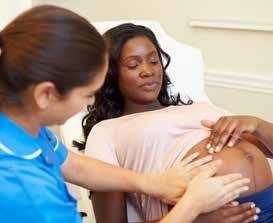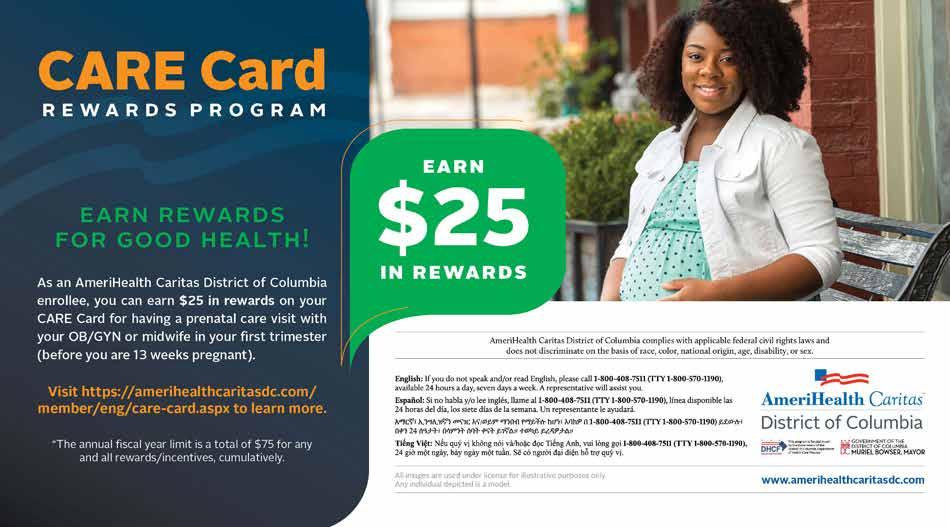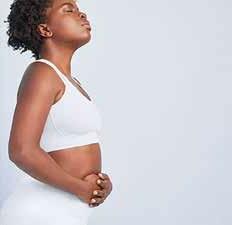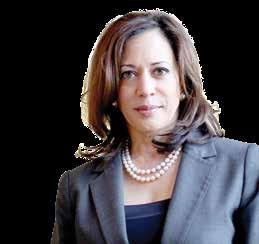
5 minute read
International
Healthy Pregnancy, Healthy Baby
Giving Your Baby a Bright Start
Submitted by AmeriHealth Caritas District of Columbia
The birth of a baby is a life-changing event, and there’s a lot to do to get ready. One of the most important is to see your health care provider for regular checkups. These checkups are part of prenatal care — the health care you get while you are pregnant. They can help prevent problems, giving you and your growing baby the best chance for good health. They also offer a safe space in which to ask questions.1
WHAT HAPPENS AT A PRENATAL CHECKUP?
During a prenatal visit, your health care provider will check for problems that can happen during pregnancy. They will ask about your health history and perform a physical exam. They’ll check your weight and discuss how much weight gain is healthy for your body. At some visits, they may also check your health with a blood test or imaging test. One type of imaging test is an ultrasound exam. These show how your baby is growing, which can be exciting to see.1
You may be asked to provide a urine sample. Infections of the urinary tract (UTIs) are common during pregnancy. They can increase the risk of giving birth too early. A preterm birth is when you have your baby before 38 weeks of pregnancy.1
WHEN SHOULD I GET A PRENATAL CHECKUP?
If you think you may be pregnant, call your provider to set up a visit. If you are pregnant, it’s best to have regular prenatal checkups. Most women see their provider each month during early pregnancy. As they get closer to their expected day of delivery, they usually see their provider more often.1
Ask your provider for a schedule of prenatal visits that’s best for your health and the health of your baby.
The information in this article is to help you learn more about this topic. It is not to take the place of your health care provider. If you have questions, talk with your health care provider. If you think you need to see your health care provider because of something you have read in this information, please contact your health care provider. Never stop or wait to get medical attention because of something you have read in this material.
If you are pregnant and an AmeriHealth Caritas District of Columbia (DC) enrollee, the Bright Start® maternity care program can help you make healthy choices for yourself and your baby. The program is designed to support you during your pregnancy and after you give birth. When you join Bright Start, a Care Manager will call you and work with you to help you receive and use program services. If your pregnancy is high risk, a team of nurses and Care Connectors will check in with you often. They can help you stay connected to care during your pregnancy.
Get help with: • Creating a birth plan • Choosing the right doctor or midwife for your family • Making appointments • Finding breastfeeding support and childbirth classes • Learning about prenatal vitamins • Finding housing • Getting supplies to prepare for your baby • Getting rides to and from your appointments • Signing up for home-delivered meals and other nutrition programs
To join Bright Start as an AmeriHealth Caritas DC enrollee, call 1-877-7596883. Our trained staff is ready to help you Monday through Friday, 8 a.m. to 5 p.m.
Source: 1. “Pregnancy Check-Ups,” National Institutes of Health, https:// newsinhealth.nih. gov/2021/04/pregnancy-check-ups.
All images are used under license for illustrative purposes only. Any individual depicted is a model.
Find us on Twitter at www.twitter.com/amerihealthdc. • Find us on Facebook at www.facebook.com/amerihealthcaritasdc. • ind us on Instagram at www.instagram.com/amerihealthcaritasdc.

By the Numbers: Fibroids among Black Women
According to McLeod Health, a centuries-old health network, offering research and health resources found that African American women suffer fibroids 2 to 3 times more than white women.

Because Black women suffer fibroids at an earlier age, they also are 2 to 3 times more likely to undergo surgery to remedy pain or other related health issues.

Black women tend to experience fibroids at a younger age and often more severely than their counterparts.
One estimate is that 25 percent of African American women will suffer from fibroids by the age of 25 and 80 percent will have them by age 50. Of the estimated 26 million women between age 15 and 50 who have uterine fibroids, more than half of them will experience complications from them.
In August 2020, then Senator
Kamala Harris (D-CA) and Representative Yvette Clarke (D-NY) introduced companion bills in Congress that aimed to fund research and education on uterine fibroids. Endometriosis is a condition in which the uterine-like tissue grows outside of the uterus. This growth still bleeds and sheds monthly, as it will during a typical menstrual period, but it occurs in an area where it cannot easily leave the body. As a result, this can lead to symptoms such as increased menstrual pain, pain with sex, abnormal vaginal bleeding, intestinal distress, infertility, and chronic pain in the lower back and pelvis. It can resemble endometriosis symptomatically is uterine fibroids. Uterine fibroids are different from endometriosis in that they are noncancerous growths that occur inside or around the uterus but can sometimes mimic each other in symptoms.
The proposed bill would have provided $30 million annually from 2021 through 2025 to the National Institutes of Health to expand uterine fibroids research, create a uterine fibroids public education program at the Centers for Disease Control and Prevention, expand and improve data collection on people impacted by fibroids and more. $30

We are proud to work alongside D.C.’s local small businesses and thank them for their service in these challenging times.
Brought to you by the MD-DE-D.C. Beverage Association with support from the American Beverage Association







